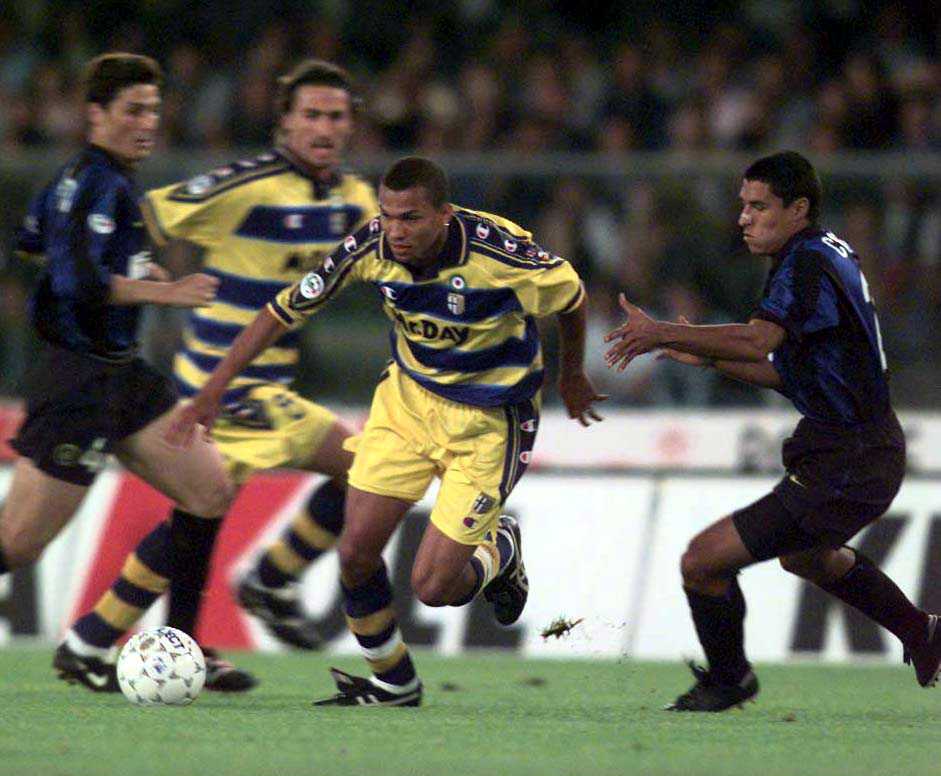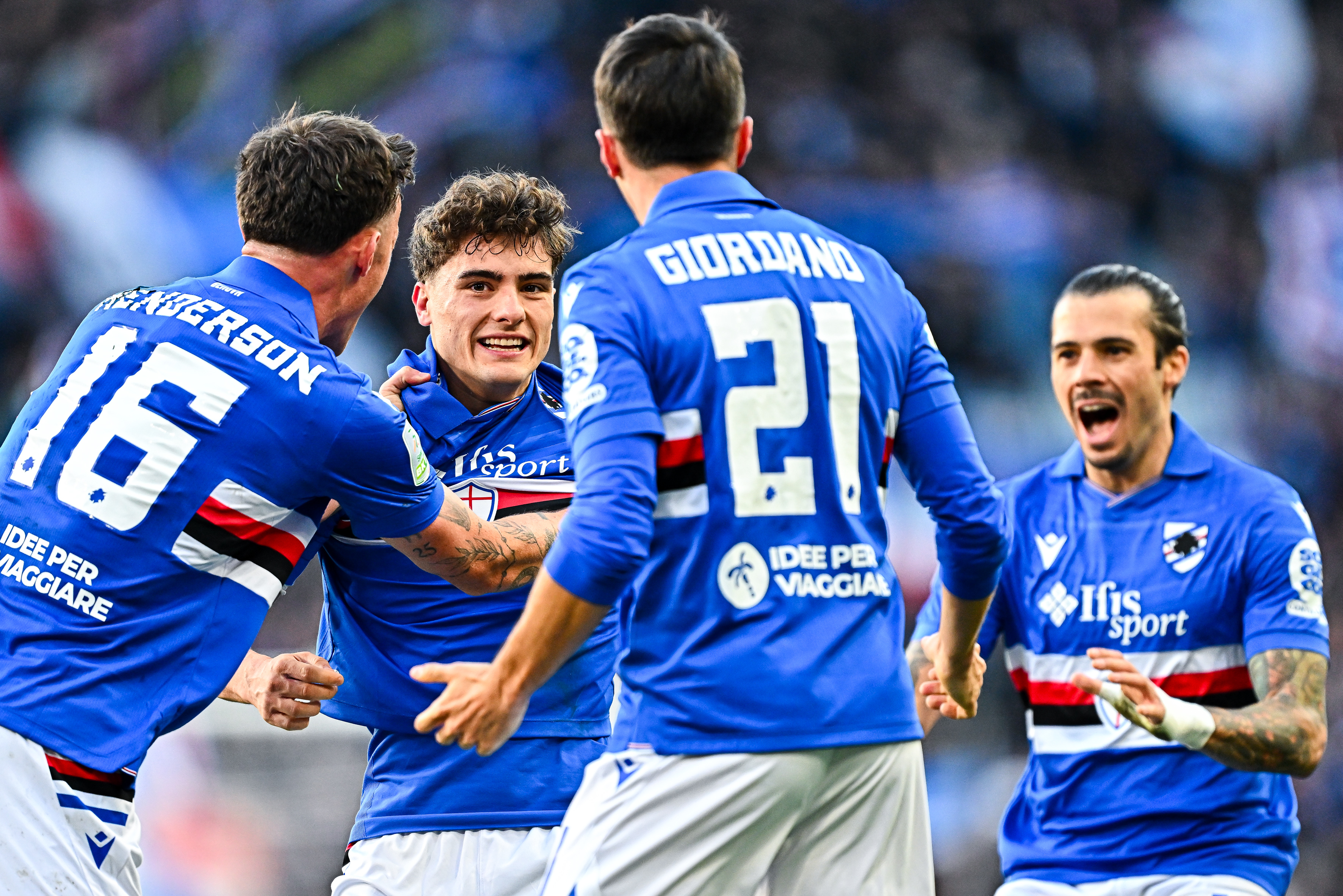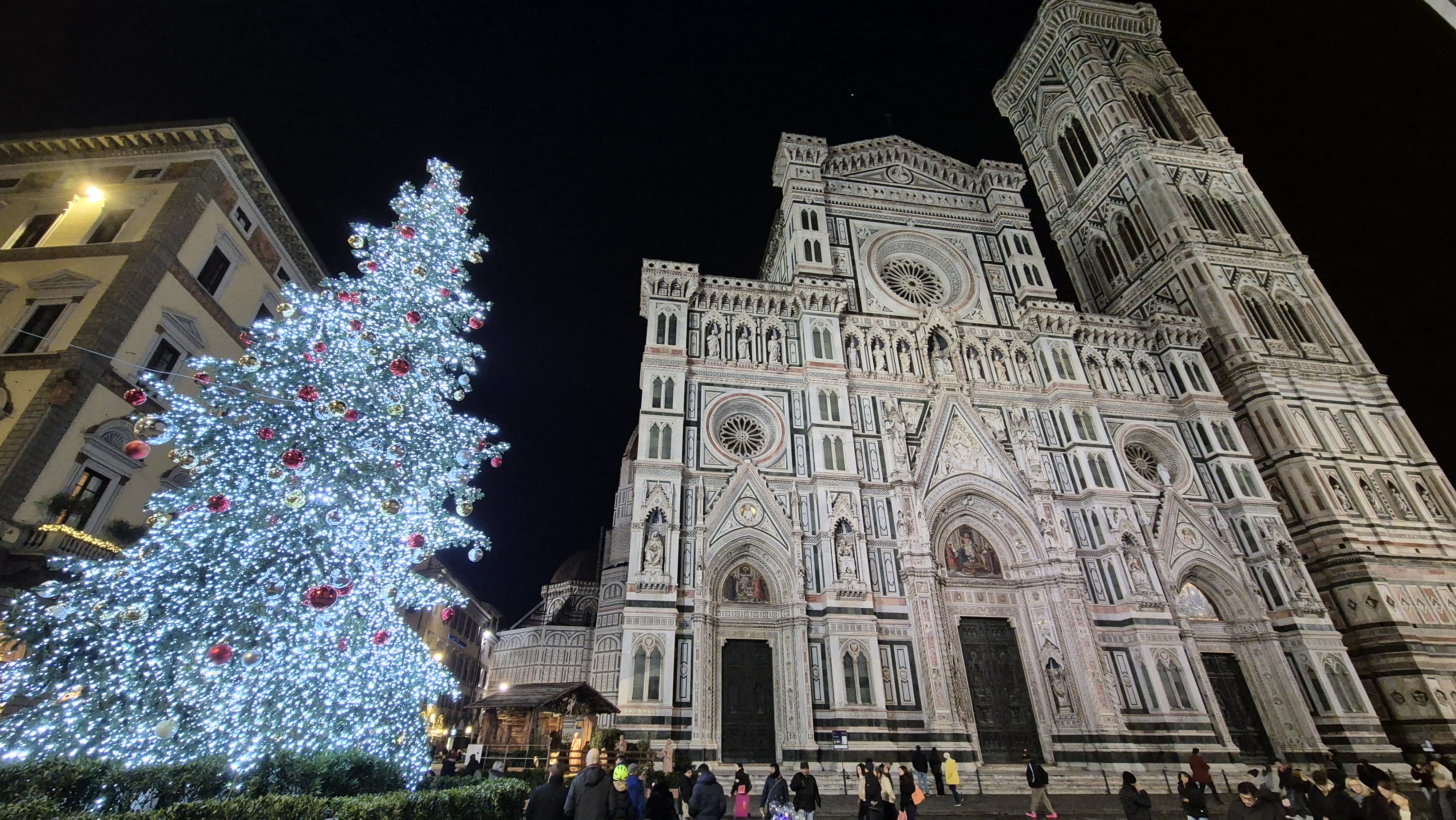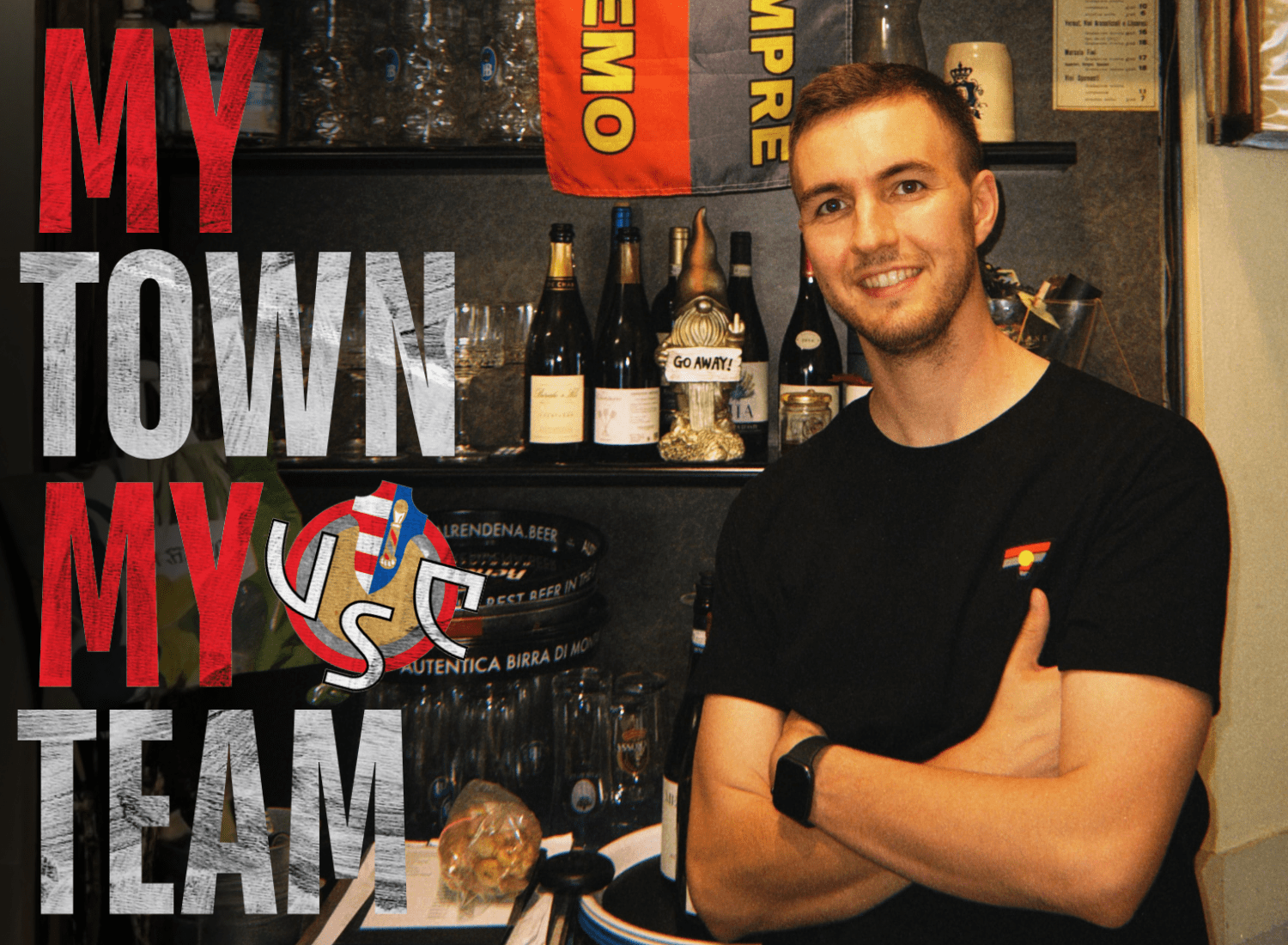
Golazzo: Marcio Amoroso, Udinese vs. Parma, 1999
By Emmet Gates
Some players orbit the sun for an extended period of time, somehow absorbing its rays and continuing to excel at the very highest level. Others simply get too close and burn out, leaving behind the fragments of brilliance that elevated them that high in the first place.
A player who fits into the second category is former Udinese and Parma forward Marcio Amoroso who, for a short window of time seemed capable of morphing into a world-class performer. The Brazilian is one of those ‘90s talents that history now tends to overlook, especially in the period he operated. As most well know, Serie A was brimming, to the point of excess, with the finest players on the planet.
Yet for one glorious season in 1998-99, Amoroso flew close to the sun, and it seemed like the world was at his feet.
Amoroso arrived in Serie A in the summer of 1996 from Brazilian side Guarani after spending a couple of years in Japan. After a brief stint with Flamengo, Amoroso was of interest to Barcelona, who wanted to bring him to Catalonia but then, wisely, opted for a striker from PSV Eindhoven called Ronaldo (whatever happened to him?). Udinese then brought the 22-year-old Amoroso to Europe.
Going from the mega city of Sao Paulo to the more ornate surroundings of Udine, not to mention the cold, must’ve been a shock to Amoroso. That being said, the Brazilian didn’t let the cold snap affect his performances. Alongside Olivier Bierhoff and the gloriously-named Paolo Poggi, Udinese qualified for the UEFA Cup after finishing fifth. After a slow start in which he didn’t score until just before the Christmas break, Amoroso scored 12 league goals in his first season in Serie A, a more than respectable record considering he outscored the likes of Roberto Baggio, Alessandro Del Piero, Ivan Zamorano and Christian Vieri.
Yet it was in the second season under Alberto Zaccheroni that the Fruili side really kicked into gear. Zaccheroni guided Udinese to third in Serie A, behind champions Juventus and a Ronaldo-inspired inter. This was the Zebrette’s highest finish in Serie A for over four decades, and once again qualified for the UEFA Cup. Bierhoff had the season of his career, netting 27 goals and besting Ronaldo, Del Piero, Baggio and Gabriel Batistuta to win the Capocannoniere crown and a move to AC Milan in the summer of 1998. Zaccheroni went with him, to be replaced by a young manager called Francesco Guidolin.
On a personal level, it was a case of second-season syndrome for Amoroso, netting just five league goals. Yet with Bierhoff now gone, it was his time to shine.
And shine he did.
The best Brazilian in Serie A
Udinese’s attack now centred around him, and Amoroso scored five goals in the opening three rounds of the 1998-99 season. However the defensive solidity under Zaccheroni had been eroded with the departure of Thomas Helveg, who also followed the manager and Bierhoff to Milan.
Udinese had only won four times by the Christmas break and were hovering above the relegation zone. An eight-game undefeated streak was broken by a surprise loss against Venezia in late February. Amoroso netted a late penalty in a 2-1 win against Roma before another defeat, this time to Juventus, followed.
And now we get to Amoroso’s crowning moment.
Udinese welcomed Alberto Malesani’s Parma to the Stadio Fruili on March 21st, 1999. Parma had hopes of finally winning the Scudetto with an all-star squad that’s now become one of the defining teams of the 1990s. The Gialloblu had been top of the table as recently as early January, but such was the relentless pace Lazio, Milan and Fiorentina were cutting atop the table that a defeat to La Viola in early in the month had sent them down to fourth.
The margin for error was slim and Parma knew nothing more than a win would do. By the end of the game Amoroso would disintegrate any lingering title dreams.
The game was only 20 minutes old when Roberto Sosa put Udinese in front, with Amoroso heavily involved. Sosa nipped in to steal the ball ahead of Nestor Sensini on the edge of the Parma box and pushed the ball to Amoroso on his right, who in turn passed it back into the tall striker’s path. Now with the ball and entirely unmarked but having Gigi Buffon bearing down on him, Sosa swivelled and slammed a half-volley under Buffon’s legs. It was a razor sharp finish.
Fabio Cannavaro was shown a straight red card for a challenge on Amoroso after being caught flat footed and hauling him down in a one-vs-one sprint. Cannavaro took the dismissal with a smile on his face and a handshake with the Brazilian. Both sides had chances before unheralded Paolo Vanoli lashed — in the truest sense of the word — a sumptuous free-kick from 25 yards out into the top corner.
The game appeared to be drifting towards a draw, which wouldn’t have done Parma’s title aspirations any favours, until Amoroso received the ball in the 88th minute.
Right-back Mauro Navas hit a long pass into the feet of Poggi, on in place of Sosa, deep into Parma’s half. Poggi took once touch, turned, glanced and launched a high pass in Amoroso’s direction. In truth, the pass was hopeful and didn’t give Amoroso any kind of advantage. Marked tightly by defender Luigi Sartor, Amoroso turned side on, controlled the high ball with his chest, flicked it over his own head with his right foot — bamboozling Sartor in the process — pushed the ball forward with his chest a second time, before smashing the ball high into the roof of Buffon’s net with his left.
Amoroso was classically Brazilian in that he could finish like a No9 but also produce the magic of a 10, and there’s no better illustration of his talent than this goal. It was his 14th of the season and his 31st for Udinese. He wouldn’t score a better one.

The game was over and with it went Parma’s title challenge. Possessing a small squad, Malesani opted to go all-in on winning the Uefa Cup, which they did in swashbuckling style, romping to the trophy after seeing off Bordeaux, Atletico Madrid and Marseille in the latter rounds. Parma ultimately finished fourth.
Amoroso, meanwhile, finished the season on a career-best of 22 goals, and won the Capocannoniere title ahead of Batistuta and old teammate Bierhoff. Amazingly, Amoroso remains the only Brazilian to win the award. Moreover, It was the second consecutive season that an Udinese player won the award. Naturally, this being Parma of the ‘90s, then-owner Carlisto Tanzi decided to sign him that summer, paying Udinese some €30m for his mercurial talents.
Yet his career could’ve turned out rather differently, as it emerged years later that Juventus had agreed a cash plus player deal with Udinese for Amoroso, only for the player in question, one Thierry Henry, refused to go the other way, sabotaging the affair.
Many of Parma’s signings in the summer of 1999 flopped, Amoroso chief among them. A partnership with Hernan Crespo had the potential to be devastating but never transpired. Amoroso scored all of 11 league goals during his two years in Emilia-Romagna before leaving the Italian game for Borussia Dortmund.
His first season in Germany saw him reproduce something close to his golden spell at Udinese, but he was never able to recapture the magic of the 1998/99 season when — for a fleeting moment — he was the best Brazilian in the league and, flew a little too close to the sun.
Related Articles
Related Articles
The Serie B season reaches halfway when the action returns after the winter break, with more live matches to look forward to on DCTV.
Florence is a dream destination year-round, but visiting during the winter months offers a completely different and magical experience.
We get a local take on what's hot in Cremona - where to eat and drink, sights to see and handy hints that might not be in the tourist guides.




